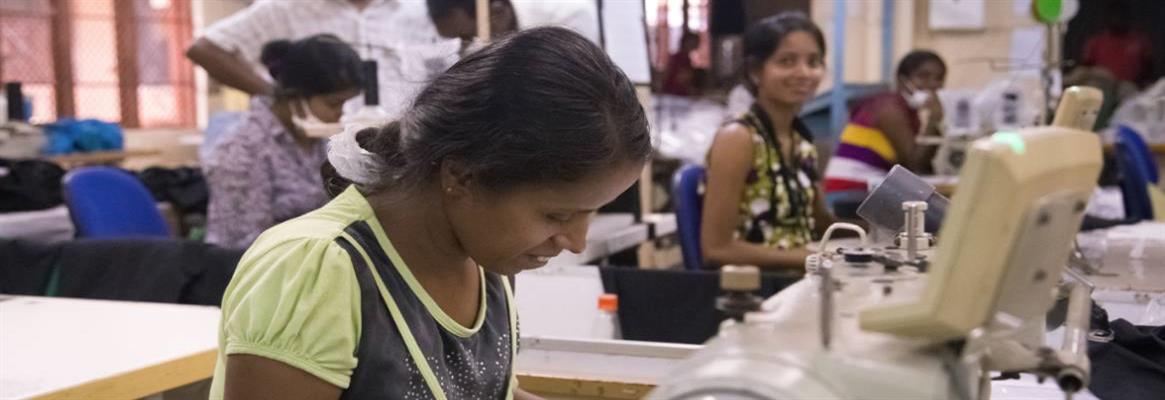Micro, small and medium enterprises (MSMEs) are the backbone of any economy, which is certainly true for Sri Lanka. MSMEs make up more than 90 per cent of all non-agricultural business establishments in the country and generate 52 per cent of GDP. They also account for 47 per cent of all employment in a workforce of about 8.18 million.
The importance of MSMEs to Sri Lanka’s economy carries over to the economically essential apparel sector. In total, Sri Lanka’s apparel sector is the source of almost 48 per cent of national exports and precious foreign exchange, in addition to contributing 7 per cent of Sri Lanka’s entire GDP of US$ 84 billion. Moreover, the sector accounts for roughly 15 per cent of all employment in the industrial sector. These 350,000 jobs – of which 20,000 are employed in the SME apparel sector. The context is important to illustrate the point that Sri Lanka’s apparel sector, and its SME sector in particular, punches above its weight, given that these 350,000 jobs account for almost half of all of Sri Lanka’s export earnings.
Disruption is a way of life
Despite many challenges, SMEs have been essential to the continued development of Sri Lanka’s apparel sector. They managed to keep playing such a pivotal role without requiring much in terms of support, but mostly on their initiative. Many large companies began as SMEs.
With the onset of the COVID pandemic, many apparel SMEs have faced severe disruptions in their operations. They are now banding together in calling for structured assistance to revitalise their businesses. One of their biggest obstacles is the structure of the SME segment itself.
Approximately 80 per cent of SMEs work in partnership with larger export firms. When the Sri Lankan apparel industry operated smoothly, orders flowed steadily; SMEs managed production capacity flexibly to handle surges in demand when needed.
Traditionally, continuous order flow has not been a feature of this segment. This is common in all apparel supply chains; there are always seasonal fluctuations in consumer demand. Company CEOs state that drops in demand mean that capacity is idle for 3 months in a year. Breaking out of that cycle was hard for SMEs even before the onset of COVID.
Capital, meet idea
When the pandemic hit, order cancellations in turn hit apparel producers across the globe. Business erosion became a daily affair for most SMEs, exacerbated by already narrow margins. In addition to seeking safe ways of returning to work, they are worried about the constraints in accessing capital to restart operations.
Identifying those who need working capital urgently is an immediate task; they are dependent on orders from larger manufacturers to retain and pay their workforce. In addition, SME owners say, reassurances that they can continue to work safely will be necessary. Some have the resources to carry on for a bit, and they are usually the resilient ones catering to niche products.
While working capital may be the most burning need, access to investment capital to buy new machines or upgrade their existing facilities will be essential to carving out a more stable and sustainable trajectory for Sri Lanka’s apparel industry SMEs.
Many SMEs have growth ambitions but are unable to realise them because they lack access to investment capital. Many small firms want to grow and market to buyers overseas directly; that is what they need, say SME Company CEOs: a strategy to achieve overseas market access, with the resources to implement it.
If the pandemic becomes endemic
Most SMEs expect COVID conditions to continue for several more months; several believe there will be a third wave. WHO officials are suggesting COVID 19 could become endemic. SME factory owners – and workers – are concerned about operating safely. Vaccinating the SME workforce is critical going forward.
SME members that belong to the Sri Lanka Chamber of Garment Exporters employ over 20,000 people, and more than 90 per cent of them have been vaccinated. Current estimates indicate that the total workforce of apparel SMEs range from 70,000 and 100,000; vaccinating the entire workforce should be mandatory, SME CEOs say.
Orders to large manufacturers have begun flowing again; executing them will need significant support from the SMEs. The larger Sri Lankan economy also depends upon the foreign currency that apparel exports earn; putting the apparel supply chain back on track is critical to achieving that.
The Joint Apparel Association Forum (JAAF) is actively engaging with its SME members, sharing best practices on safety protocols while also stepping up coordination with public health officials and the Government in order to fast-track vaccinations across SMEs.
Companies have started to think about vaccinating workers families next; workers cannot afford to get sick from being infected at home and create greater panic that could lead to a prolonged crisis. Getting SMEs back on their feet again becomes doubly hard then.
JAAF and larger players are working with national and regional Ministry of Health authorities to accelerate the vaccination of communities that are connected to the apparel industry. This is widely accepted as an important priority.
SMEs are innovation incubators
How are SMEs adapting? Firms support each other by sharing order flow and redistributing work according to available capacity. Larger companies are also working as partners sharing a certain amount of their orders with SMEs to help them retain workers and get over the hump COVID has created. Such sharing helps clear the order backlog and reinforce Sri Lanka’s reliability as a sourcing destination.
This crisis is also an opportunity to consider some long-term, permanent solutions to the structural problems that apparel industry SMEs face. JAAF used to have a technology up-gradation programme for SMEs, to meet sustainability and comply with other standards. Once the worst of this crisis is left behind, reviving a similar programme should be urgently considered, along with skill and up-gradation and training for SME workers.
SMEs seeking to specialise in serving niche needs and products have to be encouraged. For example, Adeem Uniform, an SME, is a company that produces school, work, and hospital wear uniforms for exclusive buyers in the UAE and maintains its own retail presence. The company is seeking to expand both its presence in new markets and its product lines.
In addition to working with larger companies, Estilo Apparel produces highly specialised fire-proof protection equipment exclusively for a single overseas buyer. Such innovative and specialised work has helped tide through the pandemic when sub-contracts dried up.
The continuation of the EU’s GSP is another factor that many Sri Lankan SMEs are depending upon. It would open up access to markets directly as they meet EU requirements on sustainability, ethical manufacturing, and quality. Sri Lanka’s continued GSP status will be the seal of good housekeeping for other markets like the US and the UK with similar programmes.
Apparel SMEs in Sri Lanka are resilient, but they also need a little help from their friends at home, and hopefully new friends and partners in niche global markets.
















Comments